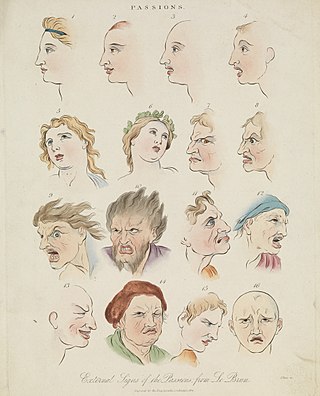Related Research Articles

Cognitive science is the interdisciplinary, scientific study of the mind and its processes with input from linguistics, psychology, neuroscience, philosophy, computer science/artificial intelligence, and anthropology. It examines the nature, the tasks, and the functions of cognition. Cognitive scientists study intelligence and behavior, with a focus on how nervous systems represent, process, and transform information. Mental faculties of concern to cognitive scientists include language, perception, memory, attention, reasoning, and emotion; to understand these faculties, cognitive scientists borrow from fields such as linguistics, psychology, artificial intelligence, philosophy, neuroscience, and anthropology. The typical analysis of cognitive science spans many levels of organization, from learning and decision to logic and planning; from neural circuitry to modular brain organization. One of the fundamental concepts of cognitive science is that "thinking can best be understood in terms of representational structures in the mind and computational procedures that operate on those structures."

Epistemology, or the theory of knowledge, is the branch of philosophy concerned with knowledge. Epistemology is considered a major subfield of philosophy, along with other major subfields such as ethics, logic, and metaphysics.

Emotions are mental states brought on by neurophysiological changes, variously associated with thoughts, feelings, behavioral responses, and a degree of pleasure or displeasure. There is currently no scientific consensus on a definition. Emotions are often intertwined with mood, temperament, personality, disposition, or creativity.

The mind is the set of faculties responsible for all mental phenomena. Often the term is also identified with the phenomena themselves. These faculties include thought, imagination, memory, will, and sensation. They are responsible for various mental phenomena, like perception, pain experience, belief, desire, intention, and emotion. Various overlapping classifications of mental phenomena have been proposed. Important distinctions group them according to whether they are sensory, propositional, intentional, conscious, or occurrent. Minds were traditionally understood as substances but it is more common in the contemporary perspective to conceive them as properties or capacities possessed by humans and higher animals. Various competing definitions of the exact nature of the mind or mentality have been proposed. Epistemic definitions focus on the privileged epistemic access the subject has to these states. Consciousness-based approaches give primacy to the conscious mind and allow unconscious mental phenomena as part of the mind only to the extent that they stand in the right relation to the conscious mind. According to intentionality-based approaches, the power to refer to objects and to represent the world is the mark of the mental. For behaviorism, whether an entity has a mind only depends on how it behaves in response to external stimuli while functionalism defines mental states in terms of the causal roles they play. Central questions for the study of mind, like whether other entities besides humans have minds or how the relation between body and mind is to be conceived, are strongly influenced by the choice of one's definition.
Pleasure refers to experience that feels good, that involves the enjoyment of something. It contrasts with pain or suffering, which are forms of feeling bad. It is closely related to value, desire and action: humans and other conscious animals find pleasure enjoyable, positive or worthy of seeking. A great variety of activities may be experienced as pleasurable, like eating, having sex, listening to music or playing games. Pleasure is part of various other mental states such as ecstasy, euphoria and flow. Happiness and well-being are closely related to pleasure but not identical with it. There is no general agreement as to whether pleasure should be understood as a sensation, a quality of experiences, an attitude to experiences or otherwise. Pleasure plays a central role in the family of philosophical theories known as hedonism.

Happiness, in the context of mental or emotional states, is positive or pleasant emotions ranging from contentment to intense joy. Other forms include life satisfaction, well-being, subjective well-being, flourishing and eudaimonia.

Knowledge is often understood as awareness of facts or as practical skills, and may also mean familiarity with objects or situations. Knowledge of facts, also called propositional knowledge, is often defined as true belief that is distinct from opinion or guesswork by virtue of justification. While there is wide agreement among philosophers that propositional knowledge is a form of true belief, many controversies in philosophy focus on justification: whether it is needed at all, how to understand it, and whether something else besides it is needed. These controversies intensified due to a series of thought experiments by Edmund Gettier and have provoked various alternative definitions. Some of them deny that justification is necessary and replace it, for example, with reliability or the manifestation of cognitive virtues. Others contend that justification is needed but formulate additional requirements, for example, that no defeaters of the belief are present or that the person would not have the belief if it was false.
Experience refers to conscious events in general, more specifically to perceptions, or to the practical knowledge and familiarity that is produced by these conscious processes. Understood as a conscious event in the widest sense, experience involves a subject to which various items are presented. In this sense, seeing a yellow bird on a branch is presented with the subjects "bird" and "branch", the relation between them and the property "yellow". Unreal items may be included as well, which happens when experiencing hallucinations or dreams. When understood in a more restricted sense, only sensory consciousness counts as experience. In this sense, experience is usually identified with perception and contrasted with other types of conscious events, like thinking or imagining. In a slightly different sense, experience refers not to the conscious events themselves but to the practical knowledge and familiarity they produce. In this sense, it is important that direct perceptual contact with the external world is the source of knowledge. So an experienced hiker is someone who actually lived through many hikes, not someone who merely read many books about hiking. This is associated both with recurrent past acquaintance and the abilities learned through them.
Empirical evidence for a proposition is evidence, i.e. what supports or counters this proposition, that is constituted by or accessible to sense experience or experimental procedure. Empirical evidence is of central importance to the sciences and plays a role in various other fields, like epistemology and law.

Compassion motivates people to go out of their way to relieve the physical, mental, or emotional pains of others and themselves. Compassion is often regarded as being sensitive to the emotional aspects of the suffering of others. When based on notions such as fairness, justice, and interdependence, it may be considered rational in nature.
Linda Trinkaus Zagzebski is an American philosopher. She is the Emerita George Lynn Cross Research Professor, as well as Emerita Kingfisher College Chair of the Philosophy of Religion and Ethics, at the University of Oklahoma. She writes in the areas of epistemology, philosophy of religion, and virtue theory.
Virtue epistemology is a contemporary philosophical approach to epistemology that stresses the importance of intellectual and specifically epistemic virtues. A distinguishing factor of virtue theories is that they use for the evaluation of knowledge the properties of the persons who hold beliefs in addition to or instead of the properties of propositions and beliefs. Some advocates of virtue epistemology claim to more closely follow theories of virtue ethics, while others see only a looser analogy between virtue in ethics and virtue in epistemology.
Experimental philosophy is an emerging field of philosophical inquiry that makes use of empirical data—often gathered through surveys which probe the intuitions of ordinary people—in order to inform research on philosophical questions. This use of empirical data is widely seen as opposed to a philosophical methodology that relies mainly on a priori justification, sometimes called "armchair" philosophy, by experimental philosophers. Experimental philosophy initially began by focusing on philosophical questions related to intentional action, the putative conflict between free will and determinism, and causal vs. descriptive theories of linguistic reference. However, experimental philosophy has continued to expand to new areas of research.
A mental state, or a mental property, is a state of mind of a person. Mental states comprise a diverse class, including perception, pain experience, belief, desire, intention, emotion, and memory. There is controversy concerning the exact definition of the term. According to epistemic approaches, the essential mark of mental states is that their subject has privileged epistemic access while others can only infer their existence from outward signs. Consciousness-based approaches hold that all mental states are either conscious themselves or stand in the right relation to conscious states. Intentionality-based approaches, on the other hand, see the power of minds to refer to objects and represent the world as the mark of the mental. According to functionalist approaches, mental states are defined in terms of their role in the causal network independent of their intrinsic properties. Some philosophers deny all the aforementioned approaches by holding that the term "mental" refers to a cluster of loosely related ideas without an underlying unifying feature shared by all. Various overlapping classifications of mental states have been proposed. Important distinctions group mental phenomena together according to whether they are sensory, propositional, intentional, conscious or occurrent. Sensory states involve sense impressions like visual perceptions or bodily pains. Propositional attitudes, like beliefs and desires, are relations a subject has to a proposition. The characteristic of intentional states is that they refer to or are about objects or states of affairs. Conscious states are part of the phenomenal experience while occurrent states are causally efficacious within the owner's mind, with or without consciousness. An influential classification of mental states is due to Franz Brentano, who argues that there are only three basic kinds: presentations, judgments, and phenomena of love and hate.

Miranda Fricker, FBA FAAS is a British philosopher who is Professor of Philosophy at New York University, Co-Director of the New York Institute of Philosophy, and Honorary Professor at the University of Sheffield. Fricker coined the term epistemic injustice, the concept of an injustice done against someone "specifically in their capacity as a knower", and explored the concept in her 2007 book Epistemic Injustice.

Well-being, or wellbeing, also known as wellness, prudential value or quality of life, refers to what is intrinsically valuable relative to someone. So the well-being of a person is what is ultimately good for this person, what is in the self-interest of this person. Well-being can refer to both positive and negative well-being. In its positive sense, it is sometimes contrasted with ill-being as its opposite. The term "subjective well-being" denotes how people experience and evaluate their lives, usually measured in relation to self-reported well-being obtained through questionnaires.
Susanna Siegel is an American philosopher. She is the Edgar Pierce Professor of Philosophy at Harvard University and well known for her work in the philosophy of mind and epistemology, especially on perception.
Jennifer Nagel is a Canadian philosopher at the University of Toronto. Her research focuses on epistemology, philosophy of mind, and metacognition. She has also written on 17th century (Western) philosophy, especially John Locke and René Descartes.
Havi Hannah Carel is a professor of philosophy at the University of Bristol.
Moral emotions are a variety of social emotion that are involved in forming and communicating moral judgments and decisions, and in motivating behavioral responses to one's own and others' moral behavior.
References
- ↑ Howard, S. A. (1 January 2016). "Emotional Insight: The Epistemic Role of Emotional Experience". The Philosophical Quarterly. 66 (262): 183–185. doi:10.1093/pq/pqv047. ISSN 0031-8094.
- ↑ Monteleone, John M. (28 October 2014). "Review of Emotional Insight: The Epistemic Role of Emotional Experience". Notre Dame Philosophical Reviews. ISSN 1538-1617.
- ↑ Bothereau, Fabrice (April 2016). "Review: Emotional Insight: The Epistemic Role of Emotional Experience". Philosophy in Review. XXXVI (2).
- ↑ Milona, Michael (1 January 2015). "Michael Brady, Emotional Insight: The Epistemic Role of Emotional Experience". Ethics. 125 (2): 567–571. doi:10.1086/678366. ISSN 0014-1704.